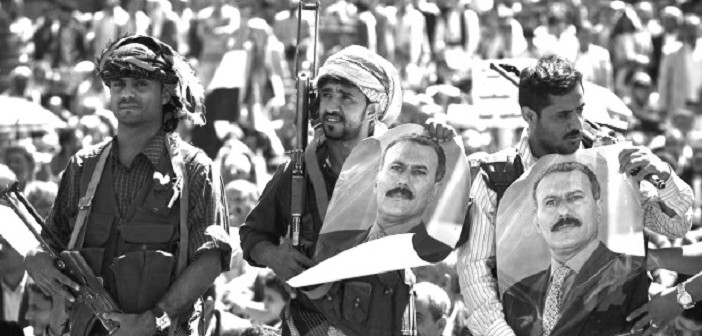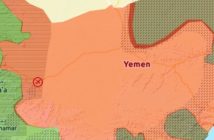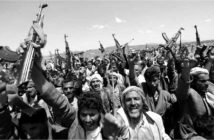And consultations lacking prospect…
It is not an exaggeration to say the following about the Kuwait consultations between Yemeni parties: the talks between President Abd Rabo Hadi, Al-Houthi and former President Ali Saleh were basically held due to international pressures.
The essential problem of these consultations is that they are lacking conditions that may produce any realistic and applicable solutions and compromises or even help to make significant progress. The consultations, which commenced three months ago, were said to be based on the UN Security Council resolution no.(2216) which plainly puts blame on Al-Houthi-Saleh alliance.
The resolution also attests President Hadi’s legitimacy and enlists Abdulmalik Al-Houthi and Ahmed Ali, the son of ex-President Saleh, in the list of the International Security Council’s sanctions. The list previously included the name of former President Saleh and one of Abdulmamlik Al-Houthi’s brothers and others. If the Al-Houthi-Saleh alliance has already agreed to comply with the resolution (2216) that means they have totally given in. However, anybody well familiar with the nature of the two groups of Saleh and Al-Houthi understands that both groups can’t accept sanctions against their leaders.
The other point is that these consultations have been conducted in light of understandings between Saudi officials and the Al-Houthi group that actually has made all concessions demanded by Saudi Arabia. Moreover, there were international pressures, mainly American, upon the parties of the conflict to reach a political settlement under which the Al-Houthi group shall maintain a small portion in the line-up of the upcoming authority, of which Saudi Arabia’s current allies shall have the largest portion of.
Obviously, these understandings overstep Saleh’s position and give Al-Houthi a more important role. Meanwhile, Saleh has continued to have significant influence on the ground, and the State’s apparatuses that he has established throughout some 40 years on personal and familial bases, and patronage network at different levels, are still more coherent—nevertheless such apparatuses were largely weakened and subjected to splits at different ranks. This clearly is evidenced in the continuation of fighting in areas such as the governorates of Shabwah and Taiz where Al-Houthi enjoys only limited popularity.
It is noticeable that those who are still fighting in these regions are troops and tribesmen loyal to Saleh. Also, it appears that Saleh’s men have the upper hand within the Saleh-Al-Houthi alliance against the government troops and popular resistance. The continuation of firing ballistic missiles into Saudi Arabia’s territories is one more evidence of Saleh’s influence and his attempts to spoil the Kuwait consultations that do not ensure him a position, a role nor power in the country’s future. The fact is that Saleh would like to say that any understandings should include him; otherwise they will never work out and cannot be applicable. He also wants to say that the main weapon arsenals that have been largely depleted and targeted by aerial airstrikes are still under his control.
The Kuwait consultations, which failed since its inception to get the two sides —particularly Saleh-Al-Houthi camp— to comply with the predetermined schedule of talks, which have continued to be reluctant, for nearly three weeks, about announcing what the UN envoy described as a UN roadmap for a political solution, set to be declared within a couple of days, that will be binding for all parties.
But so far it remains a would-be plan, since three weeks have not been enough to find a way to officially announce it. However, even if such a proposal is made public, there is almost no reason to believe that it will get greater chances at realisation than the UN Security Council’s previous resolutions—issued under the seventh chapter of the UN Convention—or those similar plans announced earlier.
On the ground, armed conflict has continued though on a smaller scale than prior to the consultations. Confrontations and battles have continued to be fought particularly in the Taiz governorate and the area of Moris, a district of the Al-Dala’e governorate, as well as in the governorate of Al-Jawf and some areas of the Al-Baidha governorate, and Ba’dan of the Ibb governorate.
The coalition warplanes have also resumed aerial strikes, even though at a limited rate. More than one year of warfare has seriously undermined the military capacities of the troops that are loyal to Saleh, and Al-Houthis militias’ combating capabilities are largely reduced as well. Therefore, they have been unable to gain significant victories on the ground that can dramatically change the course of the armed conflict.
For instance, the Al-Houthi-Saleh alliance forces have been unable to invade the area of Moris for months, which is part of a small district located on the former borders between the southern and northern parts of the country. Despite that local resistance does not receive any substantial support from the government, rather local fighters complain about harassment and being beleaguered by the southern movement’s elements in the governorate of Al-Dala’e, given that the Moris area used to be part of the north of the country before the Yemeni-reunion.
The same is true in Taiz; Saleh-Al-Houthi’s forces have not made any progress, but are imposing siege upon civilians and inflicting more damage on public infrastructure and people’s lives and properties.
In the meantime, although most of the military troop units of Hadi’s government are badly organized and under-funded and under-equipped with quality weapons, even most of the units remained unpaid for months, these units are getting bigger and more new units are being established, but they are lacking adequate quantity and quality weapons. The Saudi side, which controls this issue, seems to be cautious about arming these military units so they decided to provide them only with a limited quantity of weapons. Perhaps, the Saudis have concerns that weapons may go to uncontrolled hands or they fear that weapons may end up in the hands of Jihadists and Al-Qaeda.
On another development, the Saudi-led coalition, along with Hadi’s government troops and local forces, could wrestle for the city of Mukkala, the central city of the Hudramout province, the largest Yemeni governorate and the richest one – concerning natural resources. Al-Qaeda militants took control over Al-Mukkala nearly a year ago. Yet the coalition backed by the government’s troops could drive the militants out of the city swiftly, with very limited loses.
That actually has a positive impact on Hadi’s government position and on his negotiating team in Kuwait, whereas it has negatively affected the Saleh-Al-Houthi alliance—that used to capitalize on the danger of terrorism to present themselves as the only local party that is ready and qualified to counter terrorism and terrorists. In fact, that used to give them a significant leverage during negotiations with regional and international powers.
The return of the Ahmed Ben Dagher government to Aden enhances President Hadi’s position. Ben Dagher, is one of the main dissidents who defected recently from Saleh’s party. Hadi dismissed his deputy and former prime minister of his government, Khalid Bahah and appointed Ben Dagher. Hadi and Bahah were in disagreement. The two men’s attitudes were not identical about key issues, particularly, as Bahah tried to demonstrate a more moderate position toward the Al-Houthi-Saleh alliance, which gave Hadi the impression that Bahah was seeking to replace him.
Bahah seems to have put his bet on a political settlement that may open a road for him as a consensual president. Rumors go recently, that the UAE are behind Bahah, making his strategy appear as not entirely unfounded. The fact is that there are really some differences among the members of the Saudi-lead coalition and there are even conflicting interests and different agendas of the member states – though such disputes are kept under the carpet. However, recently some news leaked about the UAE troops’ withdrawal from Yemen.
Anyway, the return of Ben Dagher along with some ministers of his government reflects the desire to normalize the situations in Aden and the areas where the government regained control, and demonstrates an intention to address basic services problems and to try to contain the hardliners within the southern movement’s ranks that are strongly advocating the notion of separation.
Undoubtedly, the government’s position is further enhanced by improving the security situation and weakening Al-Qaeda and the Jihadist factions.
Yet the government’s success is to be judged by its capability to deal effectively with social problems and difficult living conditions of the population – which have already been seriously exacerbated by the war.




